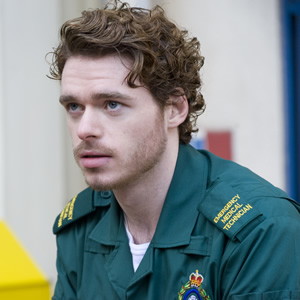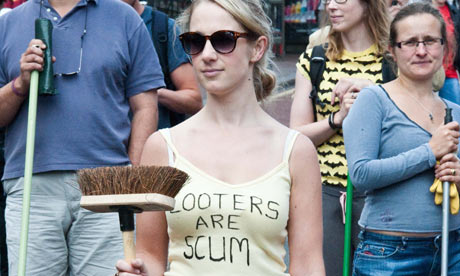Last week we saw the series finale of Sirens, a channel 4 drama about the life of three paramedics. It was an interesting and funny series, but not the main reason of this article though.
There's a gay character on the series: Ashley Greenwick, played by Richard Madden, who is what some will define as "straight acting", he is out, but not making a fuss out of it Madden defines his character as a "gay man who isn't defined by his sexuality", adding that he was excited about that "because I don't remember the last time we saw that on British TV. We don't really get to see gay characters who are completely open with their sexuality, but it doesn't define who they are." Certainly he has a point in saying that we don't see much of those type of gay men on the media, nor here, nor in the US or other english speaking television or films, and I'm not only thinking on the over the top camp characters, but also the ones that even when not camp, their lives orbit around the scene and their sexuality (eg. Queer as Folk)
But is this a reflection of what is happening inside the gay culture as a whole? I think it is.
In this country almost all the legal battles are won for gay people, granted, there's still a lot of homophobia in the society, and much work to be done in terms of sexual diversity acceptance, but now the work is down to communities, schools, educate people, since we have laws now that grant protection and rights for people who are not heterosexual. Perhaps the only battle left is marriage equality, and the campaign Equal Love is fighting this on the European Court of Human Rights.
 That has allowed many people, specially the young generation, to be open on their sexuality, yet living their lives without their sexuality being a central part of it or define who they are. There's no more need of being inside the ghetto and being overly flamboyant and camp to diferentiate yourself from the heterosexual men.
That has allowed many people, specially the young generation, to be open on their sexuality, yet living their lives without their sexuality being a central part of it or define who they are. There's no more need of being inside the ghetto and being overly flamboyant and camp to diferentiate yourself from the heterosexual men.
However, not everyone seems to be happy with this. There has being lots of critics on the marriage equality campaign, surprisingly, coming from the gay community itself. The argument: it's a way to force assimilation into the hetero-normative society, and endangers the exciting, visionary, alternative culture that the gay culture represents, being marriage and monogamy a thing for "straight" people. This same criticism is targeted to the "straight acting" gay and bisexual men and women, who are accused of act as a heterosexual, for not conforming with the stereotypes (for some) or gay alternative cultural behaviour (for others)
For some, integration to the society and making sexuality just one of many things in your life is the goal, and an alternative culture is synonym of segregation; for others it's ok being immerse on the gay culture, where everything has to be gay (a gay house, a gay garden, gay music, etc.) and integration is saw as negative assimilation.
I wonder if we are going to be seeing these divisions grow, and these two types of LGBT people in divergent roads?
I think there's still the need of diversity friendly safe havens, as forums, as some gay bars and clubs and activities, but is the majority of people inside the LGBT community wanting to move forward to integration or want to retain their status as alternative and differentiated culture?
There's a gay character on the series: Ashley Greenwick, played by Richard Madden, who is what some will define as "straight acting", he is out, but not making a fuss out of it Madden defines his character as a "gay man who isn't defined by his sexuality", adding that he was excited about that "because I don't remember the last time we saw that on British TV. We don't really get to see gay characters who are completely open with their sexuality, but it doesn't define who they are." Certainly he has a point in saying that we don't see much of those type of gay men on the media, nor here, nor in the US or other english speaking television or films, and I'm not only thinking on the over the top camp characters, but also the ones that even when not camp, their lives orbit around the scene and their sexuality (eg. Queer as Folk)
But is this a reflection of what is happening inside the gay culture as a whole? I think it is.
In this country almost all the legal battles are won for gay people, granted, there's still a lot of homophobia in the society, and much work to be done in terms of sexual diversity acceptance, but now the work is down to communities, schools, educate people, since we have laws now that grant protection and rights for people who are not heterosexual. Perhaps the only battle left is marriage equality, and the campaign Equal Love is fighting this on the European Court of Human Rights.
 That has allowed many people, specially the young generation, to be open on their sexuality, yet living their lives without their sexuality being a central part of it or define who they are. There's no more need of being inside the ghetto and being overly flamboyant and camp to diferentiate yourself from the heterosexual men.
That has allowed many people, specially the young generation, to be open on their sexuality, yet living their lives without their sexuality being a central part of it or define who they are. There's no more need of being inside the ghetto and being overly flamboyant and camp to diferentiate yourself from the heterosexual men.However, not everyone seems to be happy with this. There has being lots of critics on the marriage equality campaign, surprisingly, coming from the gay community itself. The argument: it's a way to force assimilation into the hetero-normative society, and endangers the exciting, visionary, alternative culture that the gay culture represents, being marriage and monogamy a thing for "straight" people. This same criticism is targeted to the "straight acting" gay and bisexual men and women, who are accused of act as a heterosexual, for not conforming with the stereotypes (for some) or gay alternative cultural behaviour (for others)
For some, integration to the society and making sexuality just one of many things in your life is the goal, and an alternative culture is synonym of segregation; for others it's ok being immerse on the gay culture, where everything has to be gay (a gay house, a gay garden, gay music, etc.) and integration is saw as negative assimilation.
I wonder if we are going to be seeing these divisions grow, and these two types of LGBT people in divergent roads?
I think there's still the need of diversity friendly safe havens, as forums, as some gay bars and clubs and activities, but is the majority of people inside the LGBT community wanting to move forward to integration or want to retain their status as alternative and differentiated culture?






